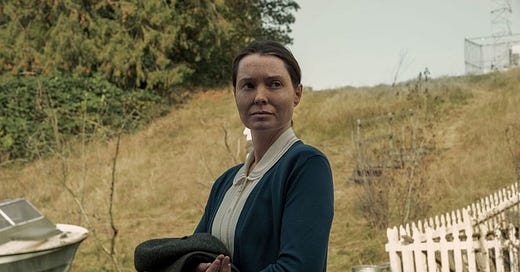Beverly Keane is willing to kill you.
And sadly, she is exactly who too many people think of when they think about the church, or evangelicals or Christians. She is judgmental and condemning, but in that way where her judgmental words, if taken alone, seem somewhat harmless, but there is a venom behind each one. I knew a lady like Bev once. She was an “all I said was…” kind of person. She’s mastered benign language with a baneful attitude. And that’s the thing about Christians like Bev: they hide their toxin behind seeming innocence, yet everyone senses the odious spirit lurking underneath.
Bev is poison. She’s comfortable with poison. She likes it. And just in case we missed that little plot point, we are hit over the head with it after Joe Collie’s dog, Pike, is poisoned and dies. Soon after Pike’s death, Sheriff Hasan questions Bev about the cache of poison she keeps in the school.
Bev reminds the sheriff that anyone — even him (which was a racist statement) — could have come in and taken some of the poison and used it for their own ends. But that’s the power of the scene. Anyone could use the poison. Bev is the only one who ever has. Bev is the towns exterminator.
And here we see the one things about Bev we can never forget. Bev is willing to kill the town to save it.
And that’s a relatable temptation.
Bev’s problem is the problem many of us face. Too many religious folks come to believe that our religion — or the way we practice our religion — is the best way to live. With that conviction, it becomes easy to coerce, twist, force, and kill others into our way of life. Sadly, concomitant with this kind of thinking comes its distorted partner — the belief that our forced coercion of others is borne of love.
It makes sense for people, whether Christian, Jewish, Hindu, Muslim or anything else to believe their religion is superior. I believe undoubtedly in the primacy of Jesus, for instance. Yet, it is inappropriate for people to coerce or force their religious beliefs on others who have not chosen it. And it is precisely my belief in the primacy of Jesus that leads me to this belief.
It does not take much digging to see how coercive religion often leads to violence. Bev’s problem, and the root of all judgmentalism, is actually quite simple; the belief that we know best. Bev believes she knows what was best for the town after the oil spill. Now she fears Joe hasn’t sufficiently suffered for the accidental shooting of Leeza, complains that parishioners fail to attend mass regularly, rejects and demeans the sheriff and his practice of Islam, and so on. Life on Crocket Island would be so much better if everyone lived as Bev believed they should.
What Bev fails to see, however, is that her way in the world is inherently corrosive and every decision she makes to judge or condemn is a step further toward death. In fact, her spirit becomes so darkened by death that when it comes to killing townspeople in the finale, she is more than willing to do so. She doesn’t question it. It’s what social observers, sociologist, theologians, and philosophers call “altruistic evil.”
Rabbi Jonathan Sack writes it this way in his book, Not in God’s Name:
“Only in fiction are the great evils committed by caricatures of malevolence: Darth Vader, Lord Voldemort, Sauron or the Joker. In real history the great evils are committed by people seeking to restore a romanticised golden age, willing to sacrifice their lives and the lives of others in what they regard as a great and even holy cause. In some cases they see themselves as ‘doing God’s work’. They ‘seem happy’. That is how dreams of utopia turn into nightmares of hell.”
Whatever Bev decides, is appropriate, no matter how ghastly. She believes it is what is best for others, even if it hurts others; like the oil spill settlement which “killed half the island,” according to Joe Collie.
For followers of Jesus, this is an important question: Our lives — and the blessing or curses we introduce to those around us — are not only the result of the beliefs we hold, but how we hold our beliefs.




